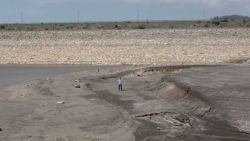Philippines President Rodrigo Duterte said he has been offered a controlling stake in a joint energy deal by Chinese President Xi Jinping in exchange for ignoring an international arbitration in Manila’s favor on the South China Sea.
In 2016, a tribunal in The Hague ruled in favor of the Philippines in a maritime dispute, concluding China has no legal basis to claim historic rights to the bulk of the South China Sea.
Speaking to reporters in the Philippines on Tuesday, Duterte said that Xi had promised him a majority stake in a joint oil and gas exploration venture that could fall within Manila’s Exclusive Economic Zone (EEZ), if the Philippines ignores the decision by the Permanent Court of Arbitration, according to CNN affiliate CNN Philippines.
“Set aside the arbitral ruling,” Duterte said, quoting Xi. “Set aside your claim. Then allow everybody connected with the Chinese companies. They want to explore and if there is something, they said, we would be gracious enough to give you 60%, they will only get 40%. That is the promise of Xi Jinping,” Duterte reportedly said.
An EEZ gives a country exclusive maritime rights to resources such as fish and oil and gas within 200 nautical miles of that land mass. Manila’s EEZ, mandated by the United Nation’s Convention on the Law of the Sea, overlaps with waters claimed by China and Vietnam.
Duterte’s comments come after he met with Xi in Beijing last week. According to China’s state-run news agency Xinhua, Xi said the two nations could take a “bigger step” in joint offshore oil and gas exploration.
“As long as the two sides handle the South China Sea issue properly, the atmosphere of bilateral ties will be sound, the foundation of the relationship will be stable, and regional peace and stability will have an important guarantee,” Xi said.
At a Wednesday press briefing, China’s Foreign Ministry spokeswoman Hua Chunying didn’t comment directly on the reported offer, but said the Philippines was “ready to expedite cooperation with China in the joint exploitation of oil and gas.”
“The two sides announced the establishment of an intergovernmental joint steering committee and a working group between relevant enterprises from the two countries on oil and gas cooperation,” she said.
Closer ties
In 2018, the two leaders preliminarily agreed to cooperate on oil and gas exploration in the South China Sea, in a move that angered many Filipinos wary of Chinese territorial expansionism in the region.
The deals included a memorandum of understanding to jointly explore for energy resources, alongside agreements on basic education, agricultural cooperatives and infrastructure projects, Philippines government spokesman J. V. Arcena told CNN at the time.
According to a Chinese draft of the deal, the Chinese side would authorize its state-owned China National Offshore Oil Corporation to undertake joint exploration in “relevant sea areas” of the South China Sea, CNN Philippines reported.
Beijing claims an enormous swath of territory in the highly contested sea, overlapping competing claims from the Philippines, Vietnam, Brunei and Malaysia, among others.
And Manila has been in an awkward dance between Beijing and Washington for years over the South China Sea.
The Philippines in the past has taken a strong line on China’s behavior in the area, even taking China to the international tribunal. But under Duterte, the government has increasingly looked to build an economically beneficial relationship with Beijing.
Nevertheless, tensions between the two sides in the disputed waters have remained tense. In April, the Philippines government filed a diplomatic protest with China over the presence of hundreds of Chinese vessels near a Philippines-administered island in the South China Sea. Duterte then threatened to send his troops on a “suicide mission” if Beijing doesn’t “lay off” the island.


















